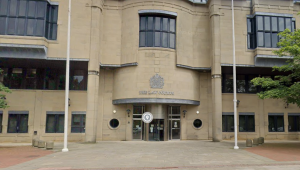A man who admitted responsibility for fly tipping being dumped in a Bradford cemetery has avoided prison.
A court heard how Imran Khan advertised a waste removal services on a community WhatsApp page.
But on two occasions, the waste collected from unsuspecting customers ended up fly tipped, with waste being left in Scholemoor Cemetery on one occasion.
Appearing at Bradford Crown Court on Thursday afternoon, Khan, 39, of Hartman Place, was given a 12-month community order with 100 hours of unpaid work and 15 rehabilitation days.
Earlier this year Khan had appeared at Bradford Magistrates Court when he pleaded guilty to three charges.
These included fly-tipping on Munby Street on 4 August, 2024, and a separate charge of handling-controlled waste without taking correct measures – which also related to the Munby Street incident.
He also admitted to handling controlled waste without taking correct measures in relation to Scholemoor Cemetery on 16 September.
However, he denied being the one who actually dumped the waste in the cemetery, saying he had loaned his vehicle to a colleague who dumped the waste without his knowledge.
At that previous appearance Bradford Council officers said they could not disprove that claim – but that his acts had still allowed someone else to deposit waste in the cemetery.
Prosecuting on behalf of Bradford Council, Lauren Smith said on 4 August 2024 the authority had been notified that a “substantial amount of waste” had been deposited on land at Munby Street. This was caught on CCTV.
She added: “On 16 September there was another report of substantial fly tipping, this time at Scholemoor Cemetery. Due to a number of similar incidents at this location over a number of weeks, this site was being checked on a daily basis.”
She said officers searched through the waste, which included building waste, litter and garden waste, and found the address of a number of people from the local area.

Image: Google Maps
After speaking to one of these people, they acknowledged it had come from their property, but said they had hired Khan to dispose of their waste legally.
She said: “They had contacted him after seeing an advert on a neighbourhood WhatsApp group where he purported to be a licensed waste carrier.”
During the investigation it emerged that Khan’s vehicle had already been seized by police following a road traffic stop by police.
The vehicle matched the one caught on CCTV in Munby Street.
Mrs Smith said: “It was obviously deliberate as you advertised a service and took payment from customers. It was a flagrant breach of the law.
“There was a significant deposit of waste in a public place, and an area of mourning.”
She told the court the investigation had cost the Council £1,908, and asked that Khan be ordered to pay these costs.
Mrs Stephenson, defending Khan, said: “These crimes were committed at a difficult period in his life. He had long standing issues with drug addiction.
“He was struggling with money, and he carried out the offending to make some money.”
Khan had only recently been released from an unrelated prison sentence, and during his time in prison had taken measures to tackle his drug addiction.
She said: “He found jail a lot harder this time than previous sentences. At 39 this is not how he wants his life to continue.
“His wife has made it clear to him this is his last chance. She sees a real change in him this time, and he has the opportunity to turn his life around.”
She said he was working as a part time labourer and was on Universal Credit – meaning he would struggle to pay any fine, and the Council’s costs.
Judge Recorder Ella Anderson told Khan “You had a number of previous convictions no relevant to this offence. We can see from your previous convictions that you have had problems with drugs and offending related to drugs.”
She added: “You know you are on your last chance, both personally and how the courts may treat you in the future.”
She gave Khan a 12-month community order that required him to carry out 100 hours of unpaid work and 15 rehabilitation days.
She said his limited finances meant he did not have to pay the Council costs.




